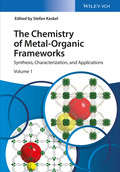The Chemistry of Metal-Organic Frameworks
Synthesis, Characterization, and Applications

1. Edition August 2016
XLVI, 848 Pages, Hardcover
439 Pictures (322 Colored Figures)
Handbook/Reference Book
Short Description
Providing vital knowledge on the design and synthesis of specific MOF classes as well as their properties, this ready two-volume reference is unique in including data sheets of commercially available MOFs, enabling readers to select the appropriate MOF for a desired application.
Providing vital knowledge on the design and synthesis of specific metal-organic framework (MOF) classes as well as their properties, this ready two-volume reference summarizes the state of the art in chemistry.
Divided into four parts, the first begins with a basic introduction to typical cluster units or coordination geometries and provides examples of recent and advanced MOF structures and applications typical for the respective class. Part II covers recent progress in linker chemistries, while special MOF classes and morphology design are described in Part III. The fourth part deals with advanced characterization techniques, such as NMR, in situ studies, and modelling. A final unique feature is the inclusion of data sheets of commercially available MOFs in the appendix, enabling experts and newcomers to the field to select the appropriate MOF for a desired application.
A must-have reference for chemists, materials scientists, and engineers in academia and industry working in the field of catalysis, gas and water purification, energy storage, separation, and sensors.
1 Introduction
2 Network Topology
PART I: MOF CHEMISTRY OF METALLIC CLUSTERS AND OTHER NODES
3 Reticular Chemistry of Metal-Organic Frameworks Composed of Copper and Zinc Metal Oxide Secondary Building Units as Nodes
4 Alkaline Earth Metal-Based Metal-Organic Frameworks: Synthesis, Properties, and Applications
5 Synthesis, Structure, and Selected Properties of Aluminum-, Gallium-, and Indium-Based Metal-Organic Frameworks
6 Group 4 Metals as Secondary Building Units: Ti, Zr, and Hf-based MOFs
7 Iron and Groups V- and VI-based MOFs
8 Platinum Group Metal-Organic Frameworks
9 Group 3 Elements and Lanthanide Metals
PART II: FUNCTIONAL LINKERS
10 Extended Linkers for Ultrahigh Surface Area Metal-Organic
11 Porous Metal Azolate Frameworks
12 Functional Linkers for Catalysis
13 Chiral Linker Systems
14 Functional Linkers for Electron-Conducting MOFs
15 Linkers with Optical Functionality
VOLUME 2
PART III: SPECIAL MOF CLASSES AND MORPHOLOGY DESIGN OF MOFS
16 Nanoparticles
17 SURMOFs: Liquid-Phase Epitaxy of Metal-Organic Frameworks on Surfaces
18 Granulation and Shaping of Metal-Organic Frameworks
PART IV PROGRESS IN ADVANCED CHARACTERIZATION OF MOFS
19 Adsorption Methodology
20 Nuclear Magnetic Resonance of Metal-Organic Frameworks
21 Electron Paramagnetic Resonance
22 IR and Raman Spectroscopies Probing MOFs Structure, Defectivity, and Reactivity
23 In Situ X-ray Diffraction and XAS Methods
24 In Situ Studies of the Crystallization of Metal-Organic Frameworks
25 Role of Molecular Simulations in the Field of MOFs
26 Defects and Disorder in MOFs
Appendix A: MOF Suppliers
Appendix B: Datasheet


